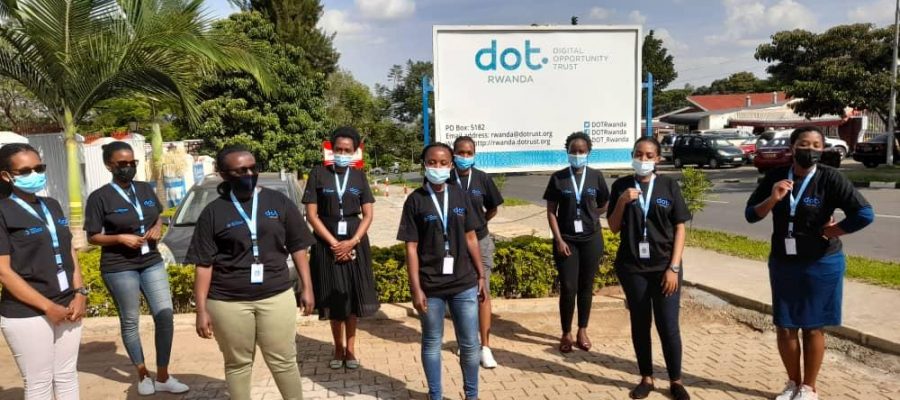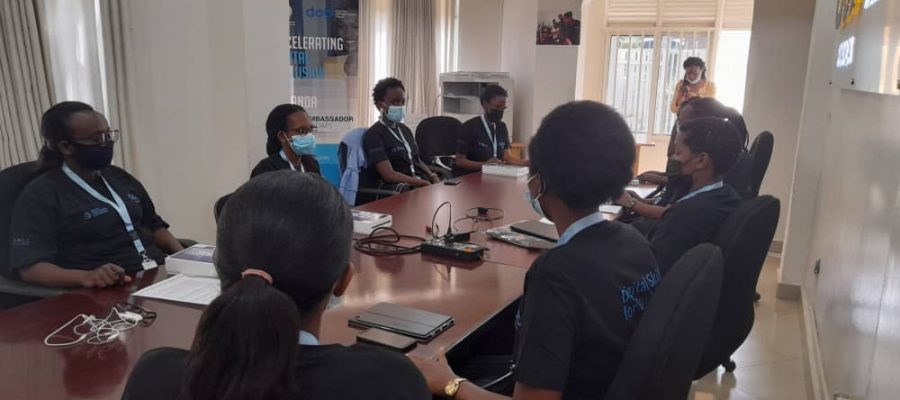DOT Rwanda Onboards Ten Young Women to Boost their practical Research Skills
Digital Opportunity Trust (DOT) Rwanda has onboarded ten young women researchers who have been trained to lead the needs assessment, baseline surveys, and gender analysis for DOT Rwanda’s recently launched projects.

In March 2021, DOT Rwanda launched two projects; the Daring to Shift( D2S )under the Global Affairs Canada partnership and the Digital Skills for Business (D24B) through the World Bank’s Digital Development Partnership (DDP), EQUALS’ Access Coalition and the GSMA.
D2S is a four-year project that places young women at the center of inclusive growth. The project aims to target 70% young women to leverage growing digital ecosystems and create new pathways for employment and digital opportunities; focusing on three pillars; (1)Business improvement through the integration of new digital tools and technologies, (2) Community Leadership and Digital Champions and (3) Social Entrepreneurship.
Through the D2S, DOT will foster resilience and economic inclusion among participating youth and their communities in Rwanda. DOT Rwanda will develop and support the leadership and decision-making power of young women to enable them to thrive despite the barriers they face in order to take advantage of economic opportunities.
 Young women researchers during a brainstorming session
Young women researchers during a brainstorming session
Through the partnership with the DS4B project, DOT Rwanda will provide young women, owners of small, micro and informal businesses with the digital skills for business to empower them to boost their ICT knowledge and adopt the use of ICT tools in their businesses, particularly those socio-economically affected by the Covid-19 pandemic.
DOT Rwanda aims to contribute to the inclusion of women in the digital economy by equipping, empowering and enabling young women to bridge the gender digital divide and develop female-led enterprises, through the digital skills for business.
Prior to the implementation of the projects, DOT Rwanda has engaged a team of ten young women researchers who will lead the Digital Skills for Business( D24B) needs assessment, the Daring To Shift (D2S) baseline survey, and the gender analysis.
Through the needs assessment, the young women researchers will identify, assess needs and opportunities for women owners of micro, small and informal businesses. The results of the needs assessment will provide the critical contextual information and insights into on-ground realities that will inform the design of the DOT Rwanda’s training content, model and establish the foundational information required for DS4B baseline. The researchers will also identify the requisite technological tools and delivery platforms, characteristics and learning requirements for women, owners of micro, small businesses. All of these will inform the Daring to Shift and Digital Skills for Business projects implementation.
The baseline survey is planned to develop indicators- aligned, quantitative and qualitative datasets that will enable DOT Rwanda to gather pre-intervention information against which to measure progress for the D2S project.
As part of the Gender analysis, DOT Rwanda’s young women researchers will gather insights about the gender context (agency, resilience, ecosystems, community dynamics, among others) in order to inform a comprehensive Gender Strategy for DOT Rwanda’s programs.
To grow their research skills with this experience, the team of 10 young women researchers participated in the research training during which they developed skills on survey methods, online data collection and research ethics. The young researchers were provided with orientation on survey instruments, Google Forms and how it works. They practiced conducting surveys on Google Forms and learned about key considerations when it comes to the survey ethics and safeguarding protocols at DOT. The team also went over data collection plans and logistics.
Following the research training, young women researchers will participate in
- The data collection phase where they will collect responses from participants and store those data properly;
- The analysis phase where they will participate in validation workshops to develop program recommendations.
We are excited to see how these young women will develop practical research skills, specifically on survey methods, online data collection and research ethics, and how their work will help DOT Rwanda to deliver scalable impacts through the Daring to Shift( D2S) and Digital Skills for Business( DS4B) projects.
